2032 SEQ Olympic Games – May 2023 Update
Table of Contents
Introduction
Why Queensland?
Economic Impact
Infrastructure Commitments
Governance
Social Objectives
Next Steps
Introduction
In a milestone moment for the city of Brisbane and the State of Queensland, in February 2021, the International Olympic Committee announced that Brisbane had won the bid to host the 2032 Olympic and Paralympic Games.
The Games are scheduled to take place between 23rd July – 8th August 2032, followed by the Paralympic Games from 24th August – 5th September 2032.
The Brisbane 2032 Olympics aims to create a lasting legacy by driving positive transformations in urban areas through significant and well-targeted investment. The Premier of Queensland, Annastacia Palaszczuk, has emphasised the need for early planning and investment in transformational infrastructure.
To help achieve this a legacy committee has been formed, to leverage the Games’ convening power to bring together governments, industry, and communities to create a long-lasting positive impact.
The annual Olympic Hawker Britton updates summarise key financial commitments and report on the progress of infrastructure developments. Hawker Britton’s April 2022 Olympic Update can be accessed here.
Why Queensland?
To determine the feasibility of hosting the Olympics, a comprehensive analysis of strategic and technical factors was conducted as part of the IOC Feasibility Assessment. In essence, Brisbane won the bid due to:
- The state’s successful track record of hosting major events, such as the Gold Coast 2018 Commonwealth Games.
- The state’s extensive sporting and transport infrastructure
- The state’s climate conditions in July and August, despite the current global challenges caused by climate change.
- Australia’s high scores on human development indices and progress towards achieving the United Nations Sustainable Development Goals
- The proposed Games align with South-East Queensland’s long-term strategy to improve local transport infrastructure, absorb demographic change, and promote economic growth.
- The games receive support from all three levels of government as well as from the private sector.
Economic Impact
The Queensland Government has released a 24-page Value Proposition Assessment Executive Summary (VPAES) and commissioned numerous studies evaluating the economic impact of the Games.
Costs for hosting the Olympic Games fall into three main categories:
- Operational costs:
- workforce, technology, transportation, administration, security, catering, ceremonies and medical services
- Direct capital costs:
- competition venues, Olympic village(s), international broadcast centre, and media and press centre
- Indirect capital costs:
- road, rail or airport infrastructure, hotel upgrades or other business investments incurred in preparation for the Games but not directly related to staging the Games.
The Games will generate an estimated $8.1 billion in benefits to Queensland.
Expenditure resulting from the games is expected to create approximately 122,900 full-time equivalents (FTE) at a national level and approximately 91,600 FTE jobs in Queensland over the 20-year evaluation period.
The Queensland Government aims to leverage the Games as an opportunity to showcase Queensland as a healthy and secure destination to trade, invest and visit.
- Tourism and Events Queensland (TEQ) has assessed that the Games would generate an additional $20.2 billion in international overnight visitor expenditure for the period 2020 to 2036
- Trade and Investment Queensland (TIQ) assume that across the four years following the Games, there will be a 0.2 per cent Games-induced boost to exports.
The total potential value associated with quantified social benefits is estimated to be up to $3.50 billion for Queensland and up to $9.11 billion for Australia. Social benefits include:
- Upskilling local residents
- Social Cohesion and Community Pride
- Business to government networks
- Inclusion and Diversity
- Destination Branding
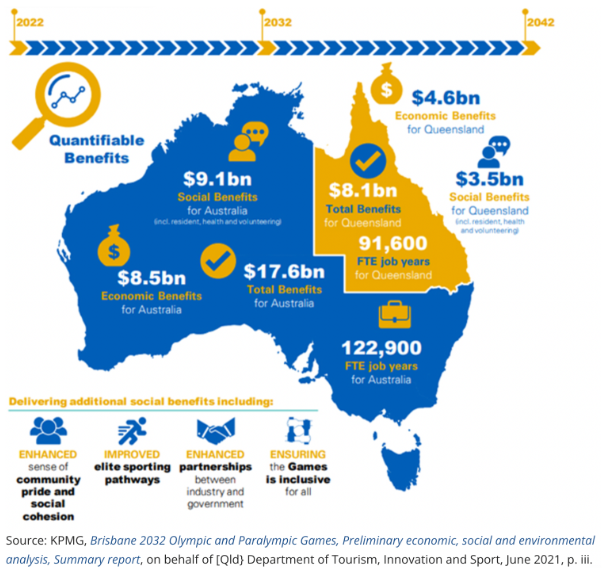
Collaboration with business
A Forward Procurement Plan with initiatives to support businesses looking to participate in Games-related opportunities has been developed.
Certain business ventures, technology upgrades and product development may take years to plan, implement and finance. Thus, businesses are encouraged to take a proactive approach and start planning to ensure they are prepared to leverage Olympics procurement opportunities as they start to arise.
All current and future procurement opportunities for suppliers are listed on the QTenders Government website. Businesses can also register to receive updates directly from the Queensland Government website.
Queensland has long-leveraged International events to drive investment and encourage positive urban development.
Infrastructure Commitments
The infrastructure plans for the Brisbane Olympics are comprehensive and forward-thinking, reflecting the Queensland Government’s vision to establish South East Queensland as a premier global tourism destination and Australia’s hub for wellbeing. These plans will be the catalyst for the region’s transformation into a more integrated, livable, sustainable, and innovative place.
Funding
As part of the October 2022 budget, the Federal Government pledged $24.7 million over a 12-year period. This funding will be used for infrastructure investment oversight, as well as the coordination of Australian Government operational guarantees.
Additional funding announcements are anticipated in both the 2023 Federal Government and the 2023 Queensland state budget.
Sixteen new or upgraded venues will receive close to $1.87 billion in co-funding on a 50/50 basis between the state and federal governments.
Given the rapid population growth in South-East Queensland, major infrastructure upgrades and the expansion of public transportation infrastructure were already in progress. It is probable that some of these expenses may not be included in the indirect capital costs of the Games since they would have been implemented regardless of whether Brisbane was chosen to host the 2032 Games. This includes the city deal, further information on which is available here.
Venues
The Brisbane 2032 Master Plan requires 37 competition venues to host 28 Olympic and 22 Paralympic sports.
The International Olympic Committee’s New Norm reforms were key to guiding the venue selection process as they recommend utilising existing and temporary infrastructure. 84% of the venues identified in the plan already exist or will be temporary.
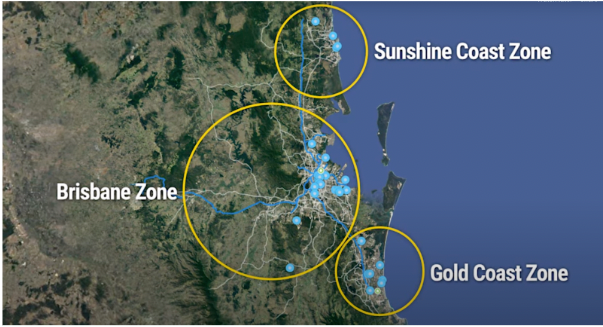
- Brisbane—22 venues
- Gold Coast—6 venues
- Sunshine Coast—4 venues
Another five cities (Cairns, Townsville, Toowoomba, Melbourne and Sydney) will host football primaries. The Whitsundays is being considered as the venue for sailing.
The embedded video outlines the locations of the competition venues:
- Brisbane—22 venues
- Gold Coast—6 venues
- Sunshine Coast—4 venues
Another five cities (Cairns, Townsville, Toowoomba, Melbourne and Sydney) will host football primaries. The Whitsundays is being considered as the venue for sailing.
The embedded video outlines the locations of the competition venues:
The video can also be accessed here.
New Venues
Construction of six brand-new venues is set to begin in 2025, with all venues expected to be completed one year prior to the Games.
Of these six venues, four will be developed as “Community Centres”, delivering over 40 new multi-use court spaces in South East Queensland. The locations were selected to align with long-term development plans and expected growth patterns to ensure the games leave a lasting legacy.
Following the example set by the Coomera Indoor Sports Centre, which was originally constructed for the 2018 Commonwealth Games and is still being used as a multi-use court space today, these new centres will be commercially sustainable and provide social benefits to the local community beyond 2032.
Brisbane Live Arena
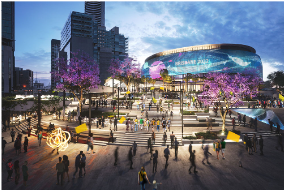
Location: Roma Street Parklands
Games capacity: 15,000 seats
Games events: Olympic Swimming, Olympic Water Polo finals and Paralympic Swimming
A temporary swimming pool atop Roma Street station will be temporarily constructed.
Brisbane Arena is planned to be built within the Roma Street precinct with easy access for people of all mobilities to the city’s rail and bus network
The Queensland Government will fund the $2.7 billion redevelopment of the Gabba while the Federal Government will provide $2.5 billion for the Brisbane Arena development.
More information is available in the embedded video below or is also available here:
Moreton Bay Indoor Sports Centre
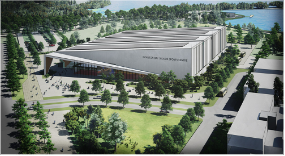
Location: Petrie, Moreton Bay
Games capacity: 7,000 seats with temporary seating overlay
Games events: Olympic Boxing
Brisbane Indoor Sports Centre
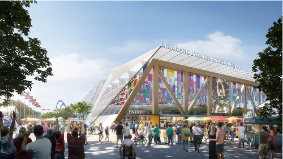
Location: Albion, Brisbane
Games capacity: 12,000 seats with temporary seating overlay
Games events: Olympic Basketball and Paralympic Wheelchair Basketball
The new indoor sports centre is proposed to be a landmark facility for the community, including use for high-performance and para-sports before and after Brisbane 2032.
Sunshine Coast Indoor Centre
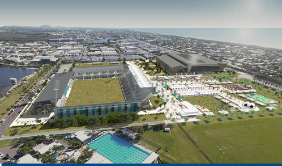
Location: Kawana Sports Precinct or Maroochydore
Games capacity: 6,000 seats with temporary seating overlay
Games events: Olympic Basketball Preliminaries
The new venue is proposed as an indoor sports centre in the Kawana Sports Precinct or as part of a Convention and Exhibition Centre in Maroochydore City Centre. Technology and carbon neutrality will underpin a substantial city centre at Maroochydore. A mid-rise precinct will be powered via a solar farm at nearby Valdora and will include fibre-optic telecommunications cables. In what may be a first for Australia, a new system will sluice garbage from chutes through underground vacuum pipes.
Chandler Indoor Sports Centre
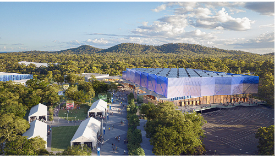
Location: Chandler, Brisbane
Games capacity: 10,000 seats with temporary seating overlay
Games events: Olympic Gymnastics and Paralympic Wheelchair Basketball
The Sleeman Sports Complex was constructed for the 1982 Brisbane Commonwealth Games and will be reaching the end of its useful life in 2032. In the lead-up to 2032, the facility requires replacement to continue its legacy function as an elite and community sports facility.
Redland Whitewater Center
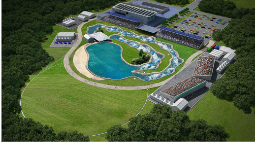
Location: Birkdale, Redlands
Games events: Olympic Canoe (Slalom)
Games capacity: 8,000 seats with temporary seating overlay
The delivery of the Sports Centres and the Whitewater venue will be undertaken by the Queensland Government Department of Energy and Public Works.
The Redlands facility will be incorporated into a broader adventure sports precinct providing the ability for emergency services and swift water rescue training for State, national and Asia Pacific emergency services personnel.
Upgraded Venues
Eight venues will receive major upgrades to support the Games.
Brisbane Aquatic Center
This venue is located at Sleeman Sports Complex. Upgrades will ensure this popular facility can continue to be used for years after the games.
Location: Chandler, Brisbane
Games events: Olympic Artistic Swimming, Diving and Water Polo events, and the Paralympic Aquatics
Games capacity: 4,300 seats with temporary seating overlay
Wyaralong Rowing Center
An upgrade of the Wyaralong facilities will support hosting opportunities for local, regional and international regattas, and generate additional revenue streams from other water-based sports and recreational activities.
Location: Wyaralong, Scenic Rim
Games events: Olympic Canoe Sprint and Paralympic Rowing and Canoe Sprint
Games capacity: 14,000 seats with temporary seating overlay
Brisbane International Shooting Centre
The centre was originally developed in 1968 and received upgrades in 2017 to host the Gold Coast 2018 Commonwealth Games.
Location: Belmont, Brisbane
Games events: Olympic and Paralympic Shooting
Games capacity: 2,000 seats with temporary seating overlay
Sunshine Coast Stadium
The Sunshine Coast Stadium is a multi-sport venue located at Kawana Sports Precinct.
Location: Kawana, Sunshine Coast
Games events: Football preliminaries
Games capacity: 20,000 seats with temporary seating overlay
Sunshine Coast Mountain Bike Centre
Mountain bike trails will be expanded to provide an international standard mountain bike facility for the region.
Location: Parklands, Sunshine Coast
Games events: Mountain Biking
Games capacity: 10,000 seats with temporary seating overlay
Toowoomba Sports Ground
Location: East Toowoomba
Games events: Football Preliminaries
Games capacity: 15,000 seats with temporary seating overlay
Barlow Park, Cairns
This venue will receive major upgrades to sporting and spectator facilities that meet the needs of their growing communities.
Location: Paramatta Park, Cairns
Games events: Football preliminaries
Games capacity: 20,000 seats with temporary seating overlay
Training Centers
There is a growing lineup of training infrastructure being built in South East Queensland.
- $2.7 million partnership between the Queensland Government and Athletics Australia for the carbon-neutral National Throws Centre.
- $2.1 million high-performance gym and athlete health suites in the Sleeman Sports Complex in Chandler.
- $10 million QAS’ high-performance gym at Nathan
- 1 million investment in the National BMX Freestyle Park on the Gold Coast.
Athletes Village

Plans to change the Northshore Hamilton area of Brisbane into a river-riverfront precinct, which will be the future home of the Brisbane Athlete Village for the Brisbane 2032 Olympic and Paralympic Games, have been accelerated.
Covering 304 hectares, Northshore Hamilton is Queensland’s largest waterfront urban renewal precinct. It will support a mix of retail, residential, entertainment, cultural and commercial uses.
Developing the Athlete Village within this area means Northshore will host 10,000-plus athletes and team officials for the Olympic Games and more than 5000 for the Paralympic Games.
Following the Games, the Athlete Village will convert to housing and commercial property, providing more than 1750 apartments, along with commercial and retail space.
A satellite Gold Coast Olympic Village has also been proposed at a site owned by the Queensland Investment Corporation and developed as a public-private partnership with the Queensland Government and QIC.
International Broadcast Centre
Visy’s Brisbane Glass Factory has been selected as the location for the International Broadcast Centre for the Olympic Games.
The Queensland Government will pay Visy $165 million for the riverfront site and Visy is expected to relocate its operations from South Brisbane to Staplyton in 2025. The 9-hectare site will likely be converted to public parklands after the games.
Transport
The Queensland Government is rapidly accelerating major public mobility projects to cater for the estimated 1.2 million new residents in the South-East Queensland region by 2036.
Over $20 billion in expenditure has been committed to improve Queenslands’ rail network with the signature piece of work being the $5.4 billion Cross River Rail. Cross River Rail will be Brisbane’s first underground rail network with six new stations and 10km of new rail line which will connect the city’s Olympic venues.
Other Public Transport initiatives include:
- $7.1 billion Queensland Train Manufacturing Program (including Ormeau stabling and maintenance facility)
- $2.6 billion Logan and Gold Coast Faster Rail Project to upgrade tracks and stations between Kuraby and Beenleigh
- The journey between Brisbane and Gold Coast is expected to be cut by 15 minutes.
- $1.2 billion Gold Coast Light Rail stage three
- $764.3 million European Train Control System rollout
- $275.7 million for Automatic Train Operation and Platform Screen Door fitment on New Generation Rollingstock
- $550.8 million Beerburrum to Nambour upgrade (stage 1)
- Over $500 million South East Queensland Station Accessibility Upgrades Program
- $360 million Park n Ride upgrade program
- $20 million Salisbury to Beaudesert business case
- $15 million Brisbane to Toowoomba passenger rail business case
- $6 million Direct Sunshine Coast line planning study
- $2.5 million Springfield to Ipswich rail corridor study
- $371.1 million smart ticketing
- The Federal government is investigating the feasibility of extending the Gold Coast line from Varsity Lakes to the Gold Coast Airport.
The re-designed South East Queensland Rail Connect plan is illustrated below.
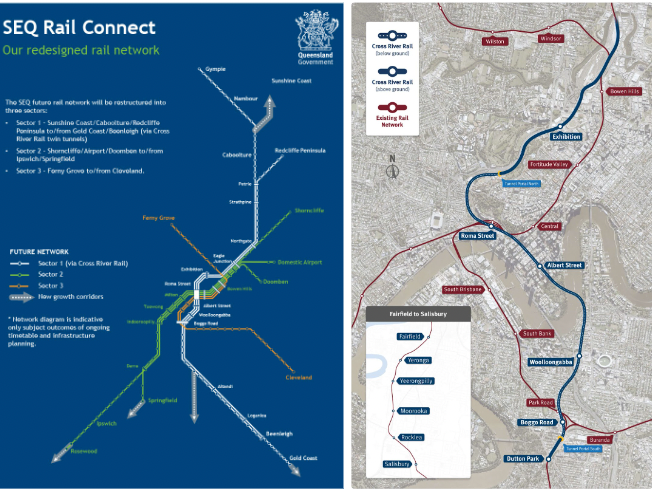
Brisbane City Council Led Projects
The City Council is working on a plan to convert the former golf course at Brisbane’s Victoria Park into a cross-country equestrian course for the 2032 Olympic Games, as well as a venue to host the freestyle BMX competition. The council will outline specific details in its Victoria Park master plan, due for release in late 2023.
The BCC has committed $294 million over the next four years to progress the 10-year Green Bridges Program.
Although two of Brisbane’s four proposed green bridges for pedestrians and cyclists were paused to prioritise flood recovery, new crossings from the city to Kangaroo Point and Newstead to Albion are expected to open in 2024.
Governance
Brisbane 2032 Organising Committee
It is a statutory authority responsible for coordinating the delivery of the Games including sponsorship, ticketing, broadcasting, ceremonies, event overlays, accommodation, volunteer management and logistics.
The Brisbane Organising Committee for the 2032 Olympic and Paralympic Games was established by the passing of the Brisbane Olympic and Paralympic Games Arrangements Act 2021 in December 2021.
The Board may establish committees (such as audit risk, and financial management committees) to assist the Board in performing its functions. The Board may also establish commissions to advise the Board.
The members of the board have changed since the board’s initial announcement in April 2022.
The current board includes:
| Representation Determined by Legislation | Current Board Members |
| Australian Olympic Committee President or Honorary Life President | Ian Chesterman |
| Australian Olympic Committee Chief Executive | Matt Carroll |
| International Olympic Committee members from Australia | John Coates (Vice President) |
| Olympic athlete | Bronte Barratt |
| Paralympics Australia President | Jack O’Callaghan (Vice President) |
| International Paralympic Committee Governing Board members from Australia | Robyn Smith |
| Paralympic athlete | Kurt Fearnley |
| Independent Directors which includes the President (five) | Andrew Liveris (President), Rob Scott, Sarah Kelly, Brett Clark, Shelley Reyes |
| Prime Minister of Australia nominees (four) | Hon. Anika Wells MP (Vice President), Graham Perrett MP, Tracy Stockwell, Rebecca Frizelle |
| Queensland Premier nominees (four) | Hon. Annastacia Palaszczuk MP (Vice President), Hon. Steven Miles MP, Patrick Johnson, Natalie Cook |
| Brisbane Lord Mayor | Adrian Schrinner (Vice President) |
| Brisbane Lord Mayor nominee | Cr. Clare Stewart |
In December 2022, the Organising Committee announced Cindy Hook as the CEO of the Brisbane 2032 Olympic and Paralympic Games. She will work with Games Delivery Partners to:
- organise events and ceremonies including the torch relays, and opening and closing ceremonies
- drive sponsorship and revenue generation, ticketing and broadcasting
- deliver the temporary infrastructure (overlay) to support Games operations including temporary athlete facilities and amenities and additional transport and security requirements
- provide accommodation and transport for competitors, officials and media
- manage thousands of volunteers to welcome athletes and guests during the Games.
Brisbane 2032 Coordination Office
The Coordination Office will oversee many aspects of the games including infrastructure, but also First Nations, environment, legacy, and security.
Unlike a delivery authority model, the Coordination Office is accountable to the Parliament.
The Office will be headed by the Director-General of the Department of Regional Development, Manufacturing and Water, Graham Fraine.
The Brisbane 2032 Coordination Office has been formalised and will coordinate delivery of the Olympic and Paralympic Games in agreement with Games partners.
Underpinning the coordinating body will be the Olympic and Paralympic Games Infrastructure Office, which will design and deliver the key venues, villages, and transport infrastructure.
The structure will be reviewed in 2025 to ensure it continues to be the best model in the lead-up to 2032.
Social Objectives
“The New Norm” is a set of 118 reforms that the IOC developed to re-imagine how the Olympic Games are delivered. They were introduced to improve energy efficiency, cost-effectiveness and long-term value.
Carbon Neutrality
From 2030 onwards, all future Olympic Games will aim to be “climate positive” and Brisbane 2032 will be a certified Climate Active Carbon Neutral Event.
As part of its commitment to embedding sustainability principles across all its activities, the IOC is working closely with the UN Environment Programme (UNEP) to support the Great Green Wall project, which seeks to combat desertification and improve food security in North Africa.
The Queensland Government is currently in the process of developing a carbon budget and has pledged to implement a range of initiatives to minimize and mitigate environmental impacts. Including:
- Repurposing and upgrading existing infrastructure
- Encouraging behavioural change
- Implementing pollution and waste management incentives
- Improving transport planning to reduce congestion and emissions.
The Queensland Government has committed to a target of net-zero emissions by 2050 and a 70% Renewable Energy Target by 2032. A summary of Queensland’s Energy and Jobs Plan which outlines the state’s renewable energy initiatives is available here.
You for 2032
While the Olympics have been known to boost infrastructure and training, there is no reliable international evidence to support the claim that it raises sport participation levels in a host country.
“The New Norm” is a set of 118 reforms that the IOC developed to re-imagine how the Olympic Games are delivered. They were introduced to improve energy efficiency, cost-effectiveness and long-term value.
Carbon Neutrality
From 2030 onwards, all future Olympic Games will aim to be “climate positive” and Brisbane 2032 will be a certified Climate Active Carbon Neutral Event.
As part of its commitment to embedding sustainability principles across all its activities, the IOC is working closely with the UN Environment Programme (UNEP) to support the Great Green Wall project, which seeks to combat desertification and improve food security in North Africa.
The Queensland Government is currently in the process of developing a carbon budget and has pledged to implement a range of initiatives to minimize and mitigate environmental impacts. Including:
- Repurposing and upgrading existing infrastructure
- Encouraging behavioural change
- Implementing pollution and waste management incentives
- Improving transport planning to reduce congestion and emissions.
The Queensland Government has committed to a target of net-zero emissions by 2050 and a 70% Renewable Energy Target by 2032. A summary of Queensland’s Energy and Jobs Plan which outlines the state’s renewable energy initiatives is available here.
You for 2032
While the Olympics have been known to boost infrastructure and training, there is no reliable international evidence to support the claim that it raises sport participation levels in a host country.
To encourage participation the Youfor2032 Talent Identification Program has been developed to identify and nurture the next generation of elite athletes in Queensland, with the goal of developing talents who can compete and win on the world stage at the Brisbane 2032 Olympic and Paralympic Games.
In 2021-22 the Emerging Athlete Pathways program invested $992,900 to support Queensland athletes, coaches and officials on 2638 occasions.
Cultural Heritage
A key aspect of the games will be honouring and showcasing Australia’s unique and ancient history of the world’s oldest living cultures.
- At least one of the Independent Directors appointed to the Brisbane 2032 Organising Committee will be a First Nations person.
- Brisbane 2032 procurement and associated initiatives will support economic and social development opportunities for Aboriginal peoples and Torres Strait Islander peoples.
- A four-year program of cultural showcasing, events and activities for Brisbane 2032 will be developed to foster celebration and learning from the world’s oldest continuous cultures.
Next Steps
Throughout 2023, the Queensland government will conduct market soundings for numerous Infrastructure Projects. During the market soundings, potential bidders, unions, construction firms and other potential stakeholders will be approached to help set tender requirements.
Your Hawker Britton Consultant is available to discuss potential business opportunities.
Ahead of the Brisbane Games, the 2024 Olympic Games will be held in Paris and Los Angeles will host the 2028 Olympic Games.
For further information about the 2032 Brisbane Olympic Games contact Hawker Britton’s Queensland Director, Emma Ramage on +61 430 8111 929.
